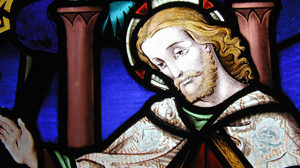Nahum 2:1, 3; 3:1-3, 6-7
Matthew 16:24-28
Reflection:
Recently I heard a speaker mention that the average lifespan in the village of first century Nazareth was between thirty and thirty five years. Archeological evidence from bones they have found from Jesus’ home village indicates people suffered from a lack of calcium and protein. Undoubtedly, advances in science, medicine and health care have pushed life expectancies now into the eighties. The drive to live longer with appreciative quality has never diminished. This attitude of preserving our lives so we live longer is addressed by Matthew’s gospel today. Contrary to the desire to live longer, Matthew places these words in Jesus’ mouth;
For whoever wishes to save his life will lose it,
but whoever loses his life for my sake will find it.
The disciples must have been perplexed. It certainly doesn’t fit the conventional mode of thinking. But then nothing in this 16th chapter of Matthew’s gospel fits with conventional thinking. Only three verses before, Peter challenges Jesus as Jesus begins speaking about being put to death and being raised up on the third day. Peter’s reaction is that he would have none of it. So today, when Jesus begins using the term “cross”, specifically, each person must “take up their cross, and begin to follow in my footsteps” it must have really rattled the disciples’ perspective. They must have been beside themselves. Jesus was inverting what they were expecting and the glory they were anticipating.
On another level, when Matthew writes this, his community is being persecuted for its beliefs in Christ. He is addressing those who are questioning if believing in Christ is really worth the suffering and persecutions they are enduring. Many are saying that it isn’t worth the persecution and they are leaving. In some ways Matthew draws a line in the sand saying, you are free to stay or free to go. Whichever you choose you will still need to answer this fundamental question. “What is the mission of your life?” Or perhaps another way of asking it is why did God create you?
This question is still fundamental to each of us today. How would you answer it? In our contemporary days of mission statements and vision statements, do you have a personal purpose statement? I think a good purpose statement could say: The reason I was brought into existence is to give praise to the one who is divine and to bring glory back to the one who created me. And a component of that is being a person of service toward others that the Great Creator has made in the divine image. If that is the purpose of my existence then nowhere in my purpose statement does suffering give me an out. My purpose doesn’t exclude suffering anymore than it embraces pleasure. While my feelings and emotions may color the way I approach my purpose, they certainly don’t negate or confirm the path of the journey. Even more, Matthew will specifically say when suffering happens within the context of fulfilling your purpose, then you are blessed (Mt: 5:11). This was one of the significant issues Matthew faced in writing his gospel. How do you address fair weathered believers. What do you do when you discover the cost of discipleship is more than you first anticipated? And this same issue faces believers today.
Jesus concludes this teaching with the reward, and that is to “see the Son of Man come in his kingship.” That statement alone is not personally strong enough to convict me of accomplishing my daily purpose. Yet I do find the inverse is true. When my vision is good and I’ve worked at my purpose that day, then before retiring and taking rest, I have clarity as I see God’s Kingdom in my world. Knowing that it is God’s kingdom and not mine, I can rest in the grace and the peace of Christ.
Fr. David Colhour, C.P. is the pastor of St. Agnes Parish in Louisville, Kentucky.

